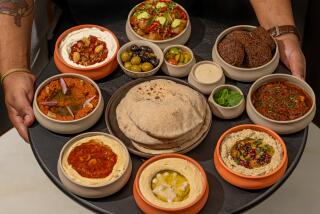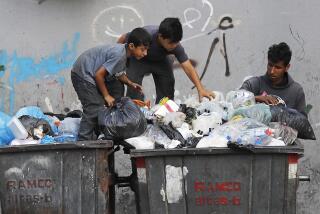Through Wet Years and Dry, the Quality Is Always Good : Hashish Remains Lebanon’s Key Export Crop
- Share via
DOURES, Lebanon — It won’t be a vintage year for Bekaa Valley hashish, but growers say connoisseurs will still get good value from each puff of “Lebanese red.”
“There hasn’t been enough rain this year so it won’t be as good as last year,” said Abu Abbas as he inspected his 11-acre field of shoulder-high cannabis, the plant from which hashish is made, growing next to a tomato patch.
“But it’s still OK--our hashish is never bad,” he said as he crushed the head of a cannabis plant, the most prized part. “I don’t know about wine, but smell this--definitely the Johnnie Walker Black Label of hashish.”
Although illegal in Lebanon, hashish is the country’s chief export crop. One dealer said he expected 175 metric tons of this year’s crop to go abroad.
Hashish is religiously haram (forbidden) for the Shia Muslims who grow the spiky weed for as far as the eye can see around the ancient town of Baalbek, now a stronghold for Muslim fundamentalists. Militant groups have left growers alone and residents say the only laws in force are supply and demand.
They say hashish, known as the “petroleum of the Bekaa” because of its economic importance, engages roughly 40% of the population in the northern part of the valley.
“We feel hashish is bad but the Lebanese crisis has forced everyone to seek a living as best he can,” said Abu Ali, 45, of Al Ain village north of Baalbek. “The Bekaa would be poor without hashish.”
Crop Easy to Grow
“Vegetables demand much more water and investment than hashish. If we had a decent government that helped us irrigate our land, things would be different,” he said.
At the end of September, when the leaves turn a soft yellow color, Abu Abbas will hire 40 people to cut down the stalks, a task that takes only a day.
The stalks will be dried in the sun for about four days before being laid out in homes or special depots for another two months, gaining moisture during the winter rainy season.
In December, leaves and pods are separated from talks. Women wearing face masks grind the leaves into a fine brown powder. Packed into cloth bags, the hashish dust is steamed and pressed into blocks.
“Our method of processing is very natural. We don’t add chemicals, so you get pure hashish,” Abu Ali said.
He said most hashish is routed through the village of Deir el Ahmar, northwest of Baalbek. It changes hands several times before reaching militia-run ports in Tripoli, Juniyah and Beirut.
“At Deir el Ahmar they decide where it goes. Once it starts moving, everyone knows his duty,” Abu Ali said. Militias along the way demand fees and little effort is made to conceal the truckloads of hashish. Abu Ali says an intricate system of personal connections at all levels generally ensures that there are no problems.
Top grade hashish called zahra (flower), from the head of the plant, sold at about 1,500 Lebanese pounds per kilo (2.2 pounds) in the Bekaa Valley last winter ($150 or less at exchange rates then).
The street price in Beirut is higher, depending on what sort of deal is made, and abroad it is mixed with other substances and sells for several times the Bekaa price.
Egyptian traders take about 40% of the Bekaa’s hashish, he said. The rest ends up in America, Europe and other Mideastern countries.
Abu Ali said he expected about 175 tons of hashish to be exported this year although farmers grew about a third less cannabis than last year. “Lots of people grew opium poppies, nearly as much land was used for poppies as for hashish.”
Cannabis has been grown in Lebanon for centuries, but as an export crop it only took off in the 1960s as Western “hippies” discovered it. Abu Ali said heroin and opium from poppies, harvested in February, now command 10 times the price of hashish.
Abu Abbas said few farmers made big profits from hashish. An acre of cannabis produces on average 35 pounds of hashish; farmers who do not process cannabis received the equivalent of $250 an acre last year, not much more than Abu Abbas made from potatoes.
Unreliable Vegetables
“But a lot can go wrong with vegetables, and roads to markets might be cut by the fighting,” he said, eyes twinkling from a deeply tanned, mustachioed face.
“But with hashish, you just plant it and it grows,” he added. “There are excellent crops and mediocre crops, but you always make money, there is always demand and there is always a way for us to get it to customers.”
More to Read
Sign up for Essential California
The most important California stories and recommendations in your inbox every morning.
You may occasionally receive promotional content from the Los Angeles Times.













